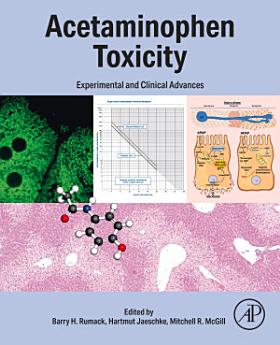Acetaminophen Toxicity: Experimental and Clinical Advances
About this ebook
About the author
Dr. Barry H. Rumack, MD, is currently Professor Emeritus of Pediatrics and Emergency Medicine at the University of Colorado School of Medicine and Director Emeritus of the Rocky Mountain Poison Center of the Denver Department of Health and Hospitals. His research interests include acetaminophen overdose and general medical toxicology. He has published over 250 peer-reviewed articles, authored, or edited numerous books and book chapters. He is or has previously been on the editorial board of a number of journals including Clinical Toxicology and Emergency Medicine, among others. He is a Fellow of the American Academy of Clinical Toxicology, American College of Medical Toxicology, and American Academy of Pediatrics and is or has been a member of Society of Toxicology, American Association of Poison Control Centers, and American College of Emergency Medicine.
Dr. Hartmut Jaeschke, PhD, is the University Distinguished Professor and Chairman of the Department of Pharmacology, Toxicology, and Therapeutics at the University of Kansas Medical Center, Kansas City, Kansas. He joined KUMC in 2006. He is a Fellow of the Academy of Toxicological Sciences and Fellow of the American Association for the Study of Liver Diseases. He has published more than 470 peer-reviewed manuscripts, invited reviews, and book chapters in the areas of liver toxicology and liver pathophysiology. He currently serves as an Associate Editor for Toxicological Sciences, the inaugural Editor-in-Chief of Livers (since 2020), and is a member of 14 editorial boards. In 2019, he was the recipient of the Translational Impact Award from the Society of Toxicology. His major research interests include basic mechanisms and translational aspects of xenobiotic-induced hepatotoxicity and tissue repair with a focus on acetaminophen overdose and mechanisms of inflammatory liver injury in animal models and humans.
Dr. Mitchell R. McGill, PhD, is currently an Associate Professor at the University of Arkansas for Medical Sciences. His primary research interests are 1) fundamental and clinical aspects of acetaminophen toxicity, 2) biomarkers of liver injury for clinical and regulatory applications, and 3) fundamental biological mechanisms of liver repair. He has published more than 100 peer-reviewed articles and has contributed chapters to more than a dozen textbooks. He is also a practicing, board-certified clinical chemist. Outside the university, he is a member of the Hepatotoxicity Working Group of the Critical Path Institute, VP-Elect of the Clinical and Translational Specialty Section of the Society of Toxicology, and serves on the editorial boards of several journals. Finally, he is an active member of the Society of Toxicology, the American Association for the Study of Liver Diseases, and the Association for Diagnostics and Laboratory Medicine.




